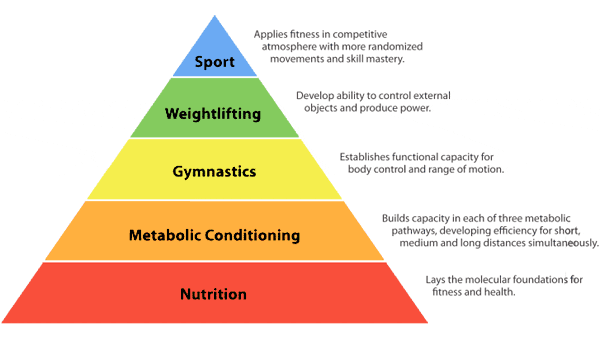Blog
NUTRITION SIMPLICITY
December 31, 2016
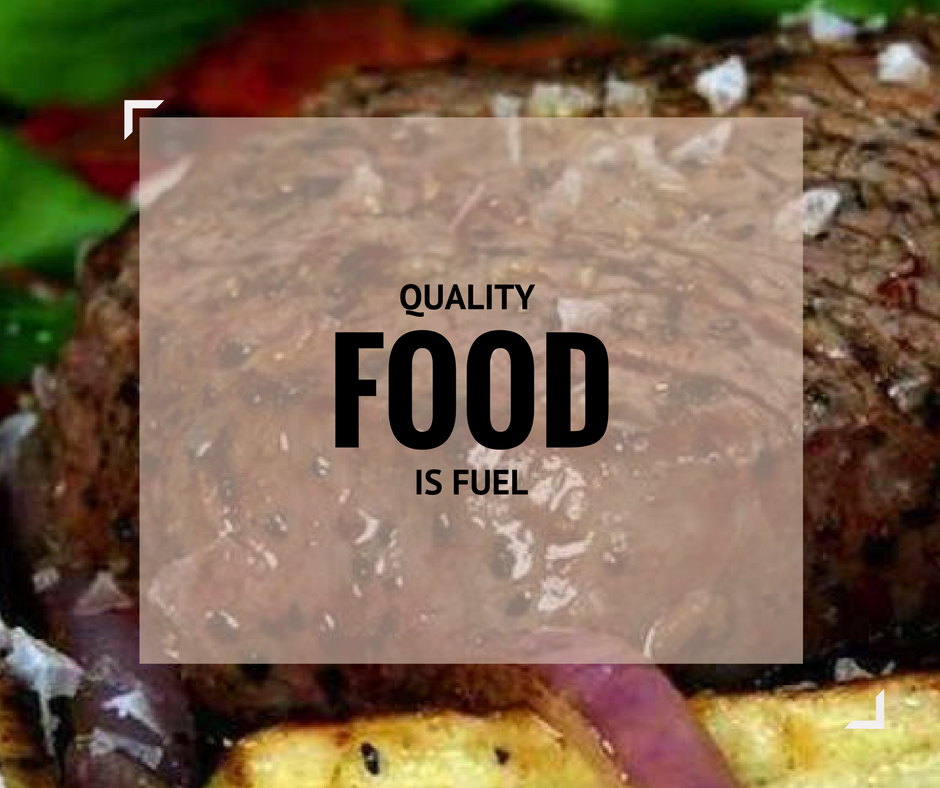
"Eat meat and vegetables, nuts and seeds, some fruit, little starch and no sugar. Keep intake to levels that will support exercise but not body fat." - Coach Greg Glassman, CrossFit Founder and CEO
This is not groundbreaking. It makes sense and supports our performance in and out of the gym. A clean diet supports proper immune function, acts as an anti-inflammatory to the digestive system, and promotes overall health and function to our bodies both internally and externally, including organs, skeletal and muscular growth.
Within CrossFit there are two popular approaches to eating; Paleo & Zone.
~Paleo. Eat food that our paleolithic ancestors ate and avoid foods that are processed (including grains, legumes, potatoes).
Buy the food from the perimeter of the grocery store & avoid the processed food in the middle that doesn't spoil.
~Zone. Reduces insulin spikes to improve performance by balancing macronutrients (30% protein, 40% carbs and 30% fats). Requires that you weigh and measure your food but you can 'eyeball it' after a while.
Do something that works for you and start easy by simply cutting the crap (chips, pop, candy, SUGAR) from your diet. Still enjoy your cheat meals (1 a week) as they keep you committed and give you a treat. For food quality, use Paleo as a guide to stay away from processed foods. For quantity, use Zone to make sure you eat more protein: your body needs it.
Food is our fuel for metabolism. What is metabolism? Does metabolic pathway ring a bell for all of you who payed attention during your Foundations class? Metabolism is all the chemical processes that go on necessary to maintain life, also to produce energy. You need energy to do stuff like walk to your car, climb stairs, pick things up, run, jump, lift, pull, push....you get the point.
When it comes to your nutrition and making choices about what to eat and what not to eat, it comes down to two questions: Where are you compared to where you want to be? What are you training for?
Protein is pretty easy to understand, but fat can be tricky. There are three different types of fat: saturated, monounsaturated and polyunsaturated. Saturated fat is the most stable and the best for your body. The problem is that when you eat a food that has fat in it, it's in a combination of all three. DAMN IT! So what do you do?
Instead of trying to know or remember exactly which meat has which kind of fatty-acid balance, just rotate your meat sources. Eat grass fed beef, chicken, seafood, eggs, and that will give you a nice balance across the three different types.
Carbohydrates are used for energy. You don't need to take in carbohydrates and can do without them. But for our style of training, you're going to want to have some carbohydrates in your diet to be effective. You can obtain your carbohydrates from vegetables, nuts and seeds, and fruit and starch. Everybody responds differently to carbohydrates. You have to test and adjust what works best for you.
My first recommendation is to stop eating sugar. Sugar kills.
Why eliminate sugar? Take a look at chronic diseases (obesity, heart disease, cancer, type 2 diabetes) in relation to 1st world countries. What you will see is a direct relationship between sugar consumption and chronic disease. When it comes to nutrition there is not one plan to fix all. Most are templates to help get you started in the right direction. There is a lot of bullshit out there as well....just watch Good Morning America for a week. You have to do your research a little bit further than whatever source of media out there that spews useless vomit about the "lose 30 pounds in a month" plan.
In our monthly nutrition class we keep it down to 3 things.
Super Basic, Impossible to Screw Up. & Don't Be Weird.
Super Basic...
Eat this: meat fish, seafood, fowl, eggs, vegetables, roots, tubers, bulbs, herbs, spices, animal fats and dairy.
Limit this: nuts, seeds, fruit.
Avoid this: cereal grains, soy, legumes, vegetable seed oils and sugar.
Impossible to Screw Up...
Gain weight: 20+ calories per pound of body weight
Maintain weight: approx. 17 calories per pound of body weight.
Lose weight: eat less than 15 calories per pound of body weight.
These are guidelines, not gospel. If you are replacing meals with bars or shakes, find the person sitting closest to you and have them punch you in the throat. Meal replacement is bullshit. Eat real food (see above). If you are a macro counter and are on the "if it fits my macros" plan, you're ignorant. All calories are not created equal. If that were the case then I'd trade the lean beef and veggies in for Reese's peanut butter cups and cheese cakes.
Don't Be Weird...
If you are just now embarking on a new way to eat and have decided to no longer be on America's supersonic train to chronic disease and diabetes-ville then just keep it simple and don't be weird. Eat when you are hungry, but eat quality, nutrient dense foods. Don't get overwhelmed with how much to eat or what time to eat and all the other details. This is too complex and overwhelming for starters and is a sure way to fall off fast. Do you own a vehicle? If so, when is the last time you put fuel in it? Did you visit a local cattle farmer and ask them if you could collect cow shit to put in your vehicle for fuel? Hopefully not. If you take care of your car engine and run quality fuel in it then why are you not doing the same for your body. It is a far more complex machine. Allow yourself some flex room. Enjoy a cheat meal at least once a week in the beginning. This gives you a short term goal to work towards every 7 days. Drink a beer, have a glass of wine, eat some cake, etc....whatever your weakness is. Enjoy it, but don't make it an every other day habit. Don't be weird.
The data is obvious. We don't have to wait another 10 years to figure out that we are eating poorly and not getting enough physical activity. The dam has already burst. If your trainer/coach isn't talking nutrition with you they are doing you a disservice, fire them.

An older gentleman approached our patrol from the west. As he got closer we noticed that he was carrying a large cloak soaked in blood. We dismounted our vehicles, set up security around the gentleman and began investigating what he had wrapped up in the bloody cloak. As tears rolled down the local national’s cheeks we soon found out that it was his young son who he had wrapped up in his arms. They had been out harvesting on their small farm when his son stepped on an anti-personnel IED (Improvised Explosive Device). His son’s body had been blown in half and he was asking us if we would clear a safe path out to a field so that he could give his son the proper burial. I posted the below statement almost 2 years ago and I still stand by it and have continued to do my part. “Regardless of your political arguments over how and why this country is in the current state that it is, it still remains an opportunity. In the 35 years I have been alive, I can, without hesitation, say I have made more mistakes than anyone I know. There is the person I strive to be, and the person I see in the mirror in the morning. It would be easy to focus only on my mistakes and shortcomings, but I try my best to judge others and myself on the things I get right. Why do we always remember the one mistake that somebody makes regardless of how much good they have done. No one and nothing is perfect. To expect perfection from any nation or person is as unrealistic as expecting to navigate your entire life without making a wrong turn. There is a reason those who die in the service of others are wrapped in our Flag. Even if only for a moment, it is a reminder that they stood for the best of what this country can be.” As you prepare for the 4th of July, whatever your plans may be, try to remember why it is that your feet are firmly planted where they are. Try to look past your personal opinions and differences. We live in a land of opportunity and the fact that we do not have to wake up in the morning worried that our heads may be cut off due to our religious or political views is pretty damn good. Most people cannot gauge that and there is reason behind that. I hope that I can do my part to shed some light on just how blessed we are as a nation. Yes, we are torn more than we ever have been, but that does not mean that we are unable to sew ourselves back together. Stop looking to others to fix it. You have the opportunity to change who you are. You have opportunity every day. Are you doing your part? Leave the world a better place. Serve others. Take action. Stand up for those that are unable to stand for themselves. Make a conscious decision to move this country in the right direction, every single day. “My hair's turning white, My neck's always been red, My collar's still blue, We've always been here Just trying to sing the truth to you. Yes you could say We've always been, Red, White, and Blue” Lynyrd Skynyrd
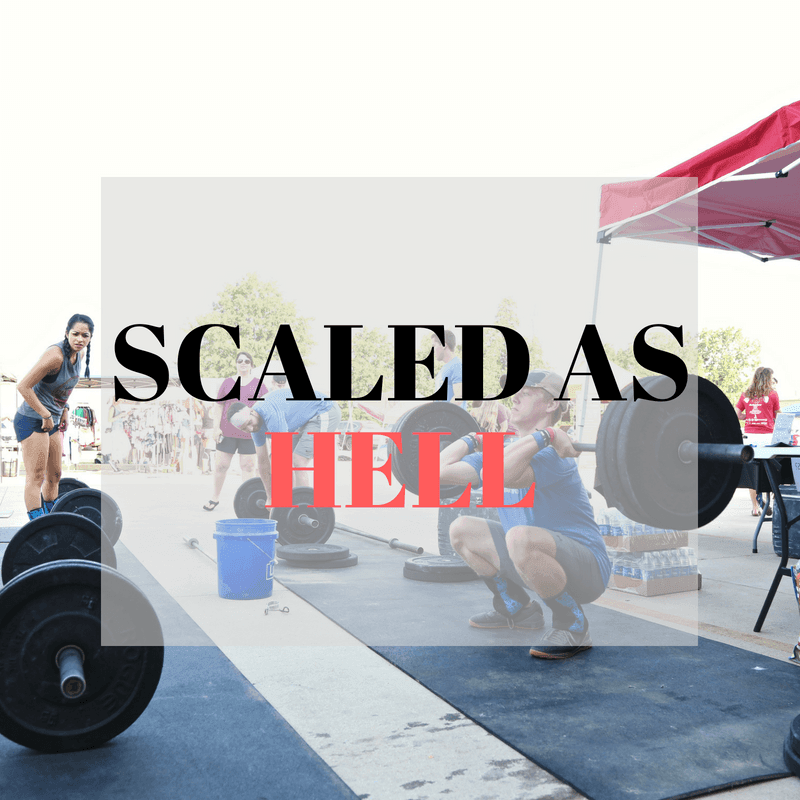
With the growth of CrossFit many new individuals have a huge misunderstanding of what it means to scale workouts. Scaling is part of the beauty of CrossFit. It is the foundation of the program and enables workouts and programming to be tailored to anyone’s ability/fitness level. At the end of the day, the best ability is functionality and if you get hurt striving to perform the workout as prescribed, or lift the suggested load, you are not enhancing your fitness level in any way, shape, or form. You are simply being an irresponsible asshole who doesn’t listen to your coach and have no business being in the Box. It is important to optimize movement patterns in a controlled setting before we add load, intensity, or complex skills. Short version, Mechanics, Consistency, Intensity. This is why there is a Foundations Course in place. This is what WOD briefs are for. Adding strength to dysfunction will lead to injury. Scaling a workout is nothing to be ashamed of. It is not for the weak and the untrained and does not mean your workout was less worthy because you scaled. Let’s break scaling down to an easier level of comprehension outside of the sport of CrossFit. So, you have decided to hit the weights and get stronger. You quantify your long-term goals and then break them down into attainable short-term goals. Long-term goal is to hit 400lbs on Back Squat. You have never put a heavy bar (implied the bar is loaded/we know most bars only weigh 45lbs.) on your back and your last “strength” coach was an overweight high school football coach who would probably shit their spines out while they are getting taco’d by 225lb bar on their back, but I digress. Are you going to walk in on day one, load 400 on the bar and attempt to squat it? Doubtfully, although I have seen plenty of this on QuarterSquatGang. There are 23 points of performance to a back squat not to mention you need a well developed nervous system to attempt a true 1RM. Scaling is meant to prevent us from getting into a staring contest with the floor during a conditioning piece. It is meant to keep us safe and healthy. Just because single-unders may not be called for in a workout today, does not mean that they are not going to be programmed tomorrow. I know plenty athletes who are great at double-unders, but have a hard time with single-unders. Does that mean that they are too fit? Absolutely not. I had to re-learn the kipping pull-up at my L-1 course b/c the workout called for kipping pull-ups and I had always performed strict or butterfly. Scaling is how you maintain quality movement with high intensity and get from the athlete you are now to the athlete you would like to become. Scaling is how you finish workouts feeling like you flirted with Pukie’s door. Using a lighter load or scaled movement enables you to keep moving forward and making progress rather than staring at the bar for minutes at a time. Scaling is how you learn to move more efficiently and build confidence to eventually lift heavier loads. First learn and master the mechanics with proper techniques and consistency, then and ONLY then add intensity. If a coach tells you to lighten the load or perform another movement they aren’t insulting you. It is called coaching. If you’re too proud to listen then chances are likely that your training life will be short lived. Never be ashamed of scaling and never write off your score because you scaled. Trust me, if you can take your ego and put it on the shelf before you step out on the floor you will progress so much faster in your journey to become fit and healthy. When you realize scaling might be better for your long-term fitness and you become less consumed with your scores and the Leaderboard, you’ll be able to appreciate CrossFit for what it’s all about. Be proud of where you are and happy that you are on the path towards becoming a better version of yourself.
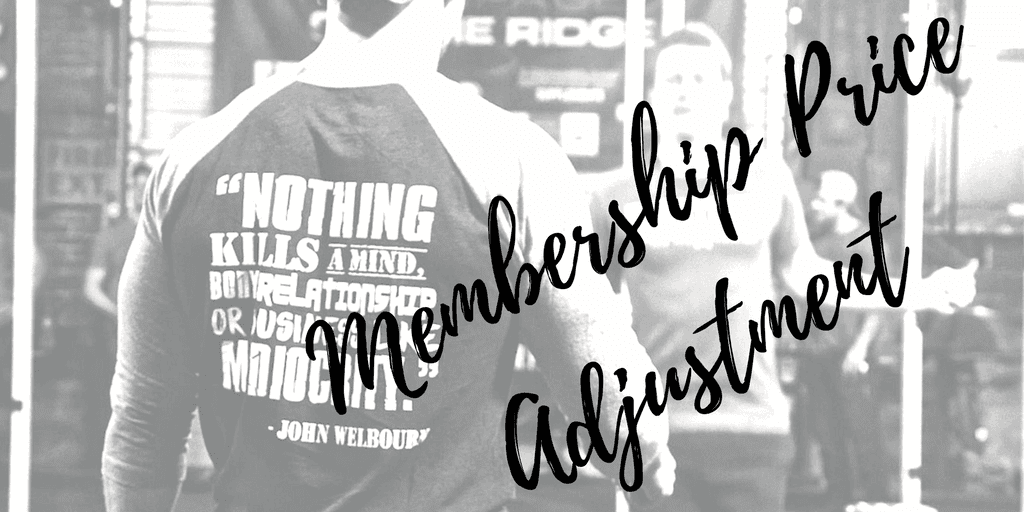
CFC will be increasing membership dues on April 1st. The following is something that is absolutely necessary for the future of our great community. The gym rates have recently been adjusted to reflect the value of our current services and to make room for more great things to come. Our new rates will allow us to provide all of you, and future members, with continued improvement on our service to you. For all of you who have been here since day one or the last few years, congrats. You have watched this place we call home outgrow 2 locations and take on 6 additional coaches! We see so many new faces and they are coming in faster and faster with every Foundations Course we conduct. Before you all get worked up over price increases, pump the breaks. All of you who have been here have nothing to fret, your rates are staying the same. Everyone who gets in before then will be grandfathered. Our rates beginning April 1st will be increasing to the following (see below). Any cancellation of a current membership will result in losing the old rate in which you are currently locked in at. All contract memberships will have a 1-time freeze option with a maximum of 60 days. Before everyone gets confused why we would do such a thing. Simply because we believe in excellence, the pursuit of excellence and our commitment to the same great program we have always had from day 1, regardless of growth. The law of exponential growth just states that we will be growing in waves. In an attempt to maintain a high-quality community of individuals who are committed to becoming healthier better versions of themselves this is necessary. Make no mistake, we would love to have everyone, but it takes a lot to walk through our doors every day. This just makes it a bigger commitment. Whenever curious friends/individuals ask me how much my gym costs, their typical response is surprise when I follow up with over a $100 a month price tag. The next question is invariably, "Why are CrossFit gyms so much more expensive than regular gyms?"—which is a valid question if you’re comparing CrossFit affiliates to whatever’s considered standard for a “gym membership.” But the answer to that question requires assessing what you’re actually paying for—and the fact that while there are many similarities (a gym is, after all, mainly just a place where you work out), the range of services and support you get will vary greatly, and may ultimately determine whether you’re back to binge watching the latest Netflix series instead of showing up to the gym and moving some dirt. Yes, we understand that we are the most expensive gym in town, but if you are looking for the cheapest option you will not find that here. We also know that CrossFit is not everybody's desired avenue of pursuit in becoming healthier, but if it is then you will get every bit of what you pay for at CrossFit Cathal. We know our value and we will deliver it to our community. If you know anybody who is on the fence about giving us a try tell them to get their glued-up hamstrings in here before the prices go up. Thanks again to all of you who have grown right alongside us! We are looking forward to a lifetime of training and moving the dirt together.

Dear Members, Without you, CFC is nothing. Without you, my dream is just that. A dream. Your faith in me has made this dream come true. And for that, I am thankful. For that, I should be paying you. Not really. But, you know what I mean. As a CrossFit Affiliate owner, one of the most common questions I get asked is “How many members do you have?” Sometimes I feel like I’m back in high school and someone is asking how much I can bench press, or what kind of truck I drive, or how big is your house? Honestly, I have never really known an exact number. I know around about where we are at but, what about the many “members” of ours that aren’t currently “paying members” anymore, or coming to class regularly any longer. I still count them as part of the CFC community. I still care about what they are doing, where their lives are taking them and hope to see them return someday soon. Nonetheless, most people seem to associate a gym’s number (AKA quantity) of members with the success (AKA quality) of the gym. While, having members is a necessity to pay bills, I have a hard time measuring the success of CrossFit Cathal primarily in how many members we are. I prefer to measure the success of our gym based on the quality of relationships that we have as a community. Where were the relationships between members and owners/staff prior to CrossFit entering the mainstream market…they were non-existent. As badly as you would like to argue your point based on non-factual data and opinion, I’m going to go ahead and stop you there and call bullshit. How do I know, b/c I was a part of that model for years. I am not saying this is a bad thing (it is if you are not attempting to fix it). Mistakes are made in every business and this has developed an awareness for others in the fitness industries? I have heard numerous great stories from members of our very own Box and from members and coaches from other Boxes. The progress we’ve made in the short time we have been open here is beyond anything I had ever hoped for. You don’t even know how advanced you are, because 95% of you have never been to another CrossFit gym. You move well. You’re constantly coached, cued and watched. You know what you’re doing. If you were left without a coach, you could run the class yourselves (although I would love to be a fly on the wall). This is called the bleed effect. Members helping members. I could go on repeat about this: YOU are the foundation of CFC. Right now, our facility is old and worn. We lack modern conveniences. Our gym is the hallmark of what CrossFit used to be back when it was more of an underground training program–a place to train and work hard with no frills, just results. Bare roots training. My dream for a bigger better facility, with more to offer and a top-notch bathroom, is recognized and in progress. Although slow, just like I tell you in training, slow progress is still progress. Move the dirt. This has not been and will not be done single handed. I will count on my charter members to help me steer the ship. I won’t be able to do it alone. The core (I hate that word) belief that drives EVERY decision I make at our gym as a coach: QUALITY TRUMPS QUANTITY. I said this as a young Platoon Leader & I believe it holds just as true today. For this reason, I will not chase members and enrollment numbers by taking shortcuts, or make unreasonable discounts. Why? I have learned from this mistake before and because I know we are damn good at what we do and we offer the best service in the fitness industry around here. I WILL NOT discount our worth to superficially grow OUR gym just so I can tell inquiring minds a magic number. My job is to make my current members happy. That is the bottom line. End of story. I am in a relationship with each one of you. However, there will be times when I am not in daily contact with all of my members. This is where our coaches and many of you will come into play. All of our coaches are an extension of me and what I have built and continue to build at CFC. It is my job and duty to you as a member that there will always be a highly-qualified and caring coach taking care of and leading you—no matter what class of the day. Will there be ups? Yes…and downs. I promise each of you that I will constantly & relentlessly pursue excellence for you as member and for us as a Box. You deserve it. Finally, after some thought I have come to a conclusion on how to answer those prying ass hats who likely don’t even know what active shoulders are, a trunk or internal from external rotation. The answer is enough, I have enough members. Because it’s true. You are enough. I look forward to many more successful years of growing alongside you. Thank you, CFC.
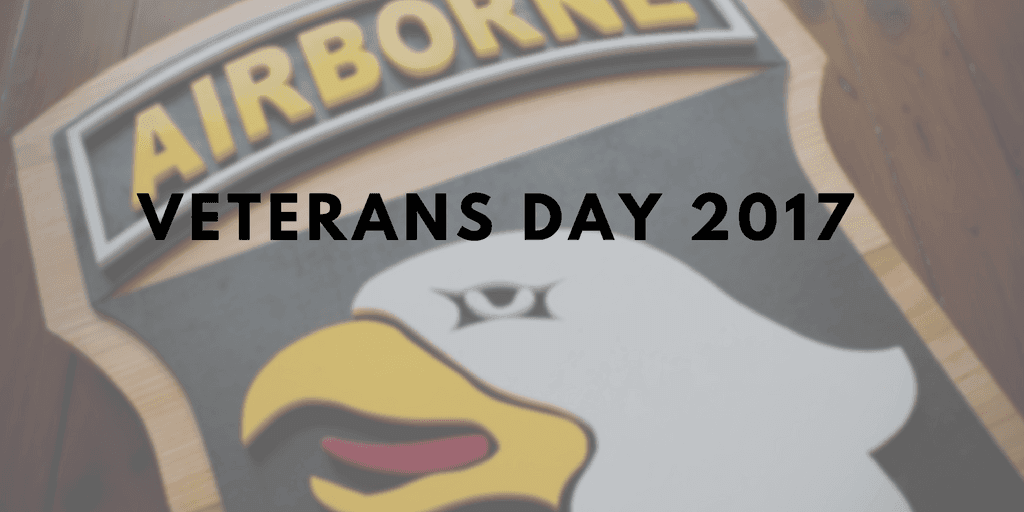
1st PLT 1037th RCC It was a typical morning in Afghanistan for my platoon. They got up, ate some chow and began prepping the crew serve weapons and vehicles while I headed to the Tactical Operations Center (TOC) to receive the latest intelligence in our battle space and if there were any IEDs detonated or found overnight by 4th platoon. Nothing overwhelming to be concerned about. Our route clearance package was ready to go by 0640hrs and we were set to start point (SP) at 0700hrs. Our route order was: RTE Summit South, RTE Summit North, MSR Hwy 1 East to Senjeray, Hwy 1 West to Howz-e Madad. We made it 300 meters down Route Summit and all hell broke loose. At 0711hrs our lead vehicle was struck by an RPG-7. An RPG does not stand for “Rocket Propelled Grenade". That's actually just an English name for the Russian weapons of the type, created to help people remember the designation. RPG stands for "ruchnoy protivotankovy granatomyot" which translates to "hand-held anti-tank grenade launcher". This particular RPG was a RPG-7VR which contains a dual 64 mm/105 mm HEAT warhead for defeating modern armored vehicles equipped with reactive armor blocks. The first warhead (64 mm HEAT) detonates the reactive armor block prematurely and the second warhead (105 mm HEAT) passes through the gap to hit the exposed armor underneath. The warhead uses the shaped charge effect to penetrate the target. When the warhead is detonated a small core of metal forms and burns through the armor. Once the armor is penetrated it travels inside the vehicle pulling shrapnel in with it. The lead vehicle was struck just behind the driver’s head. It penetrated the cab, traveled along the top of the cab and exited the opposite side. The operator was unresponsive. Our priority immediately becomes our casualty. I remember reaching for the 9 Line medevac to get a bird spun up. Before I could even pull it from the window, where I had it always readily available, another RPG hit our lead gun truck. This one struck the armor at one of its weakest points, the top corner of the door where it meets the front windshield. It penetrated the vehicle and traveled parallel to the front window before hitting the passenger side window and detonating the second round. A second vehicle was down with the two occupants unresponsive and a gunner injured severely. Within 90 seconds I had 4 guys who needed medical evacuation (MEDEVAC). Three of them were coded as urgent (surgical). Urgent (surgical)- requires inflight surgeon to perform surgery while en route to hospital. We began taking on small arms fire (SAF), continued fire from RPGs as well as indirect fire (IDF) all the while we are trying to evacuate our wounded. From the time the ambush began to the time we got our guys loaded on the MEDEVAC was 21 minutes (0711hrs – 0731hrs). It felt like an eternity. One of the individuals we loaded on the MEDEVAC was SPC Levi “Craw” Crawford. Craw suffered extensive injuries and underwent months and months of recovery procedures. For the longest time it was hard for me to see him. The feeling of guilt was heavy. As his Platoon Leader I always thought there was surely something that I could have done to have prevented that ambush. I didn’t see Craw much once we returned home, but happened to run into him at a Veterans Day event at a local high school about 3 years ago. We kept in touch somewhat over the next couple of years and then one day he contacted me about Rivers of Recovery. Levi had become the Marketing Director for Rivers of Recovery. Rivers of Recovery is a non-profit 501c3 organization that specializes in the rehabilitation of combat veterans suffering with Post Traumatic Stress Disorder (PTSD), minor Traumatic Brain Injury (mTBI), stress, anxiety and depression. Craw came to me about 3 months ago and discussed the possibility of my CrossFit affiliate partnering up with Rivers of Recovery. After a few meetings we got the idea transitioned down to paper and went from there. Now we are more than happy to say that CrossFit Cathal is a proud supporter of Rivers of Recovery. Beginning January 2018, a percentage of the proceeds from our CrossFit Foundations Course will be donated monthly to Rivers of Recovery in an effort to help year-round funding to support guided outdoor recreational activities for veterans suffering with Post Traumatic Stress Disorder (PTSD), minor Traumatic Brain Injury (mTBI), stress, anxiety and depression or any psychological or physical disability. I have always had the utmost respect for the men and women who put on our country’s uniform, bearing the weight of the American Flag and our country on their right arm. They believe in being part of something greater than themselves.
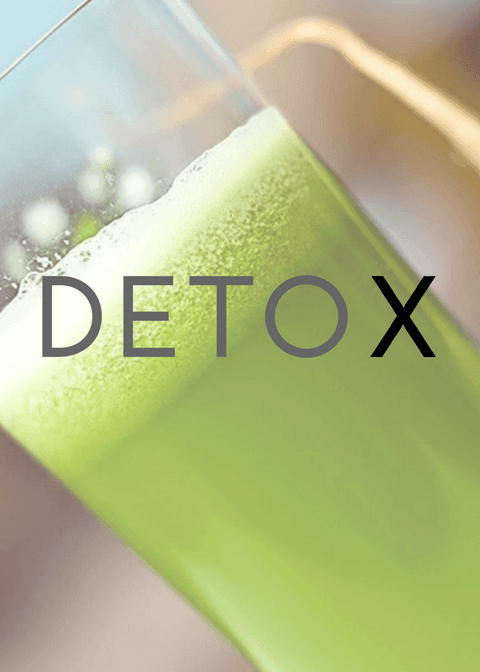
Detoxing. Is it effective? Sorry. We call bullshit on this highly marketed weight loss craze that can be found in any supplement store or online google search. For those who know me and have sat through a nutrition class or even talked nutrition with me for a few minutes know that I’m quick to dismiss the garbage that floats around promising quick fixes and jump starts to weight loss. There actually is not any research data on the effectiveness of these diets in the medical literature according to Harvard Health Publishing. There have been numerous studies done that have shown “cleansing” diets consisting of low calorie intake will lower the basal metabolic rate in order to conserve energy. Once the individual resumes to normal eating habits they experience rapid weight gain. So why do people experience a quick loss in weight when they partake in cleansing diets or detox supplements? The weight loss is mainly fluid loss due to a dangerously low intake of carbohydrates or peeing out of your butt produced by salt water, laxative tea or whatever detox supplement you are throwing down your hatch. Once the cleanse/detox period is over and the individual resumes normal eating, guess what, the weight comes back on quickly. Some of the red flags and risks involved are the lack of protein intake, dehydration, electrolyte depletion (Gatorade does not replenish electrolytes, FYI), and irritation of the digestive system. Repeating this habit can even lead to metabolic acidosis which is a chemical imbalance of acids and bases in your blood. The bottom line is that if it sounds too good to be true, it is. Many products sold online, in stores, at spas and through multilevel marketing companies promise to “cleanse” or “detoxify” your body. Dietary supplements are poorly regulated, and the people selling these products may not understand the science behind them or are just trying to make a profit. In general, detoxes and cleanses don’t promote health and longevity, and there is little evidence or research that “detoxification” actually occurs. The level of effort needed to follow certain guidelines is typically high, with strict limitations regarding what food may be consumed, how it needs to be prepared and in what combinations it needs to be eaten. Strong suggestions also accompany the use of pills, powders, tea, etc. So what is actually in those detox supplements? Some cleanses like Herbalife, Isagenix, and others contain high doses of low heat nonfat dry milk (denatured skim milk), which often cause stomach and skin issues for those who do not typically consume higher levels of dairy products. On top of that they contain artificial sweeteners, maltodextrin and isolated fructose, as well as preservatives and artificial vitamins. They also contain only around 250 calories per meal replacement, which is less than what my 30 pound dog consumes daily. Many of those who consume these cleanses report ongoing hungriness, dizziness, and overall fatigue. This is because your body is not being fueled properly, but likely going through starvation. When this happens, your body actually stores the energy you put into it as fat in order to sustain. Our body has it’s own “detox” system. How else do you think 70% of us can consume such a shitty diet and continue to function. Our “detox” system is comprised of the skin, the respiratory system, the immune system, the small & large intestines, the liver and kidneys. Together they do an amazing job of detoxing our bodies and, thereby, making nutrients ready to be absorbed into the bloodstream. If you are generally healthy and free of disease, your body is detoxing itself around the clock. Cleanses & detoxes do not produce long-term health results. If you want health & wellness then you need to make a commitment to eat healthy by consuming lean meats, veggies, some fruit, little starch and no sugar (simply put). Exercise on a regular basis and decrease processed/fast food. Our culture has become so enamored with a quick fix pill or shake to lose weight and feel healthier, when in reality, real foods are the best medicine you can get. Sacrificing your health in the short term to lose weight and see if a magical cleanse really works will only leave you with mud butt and disappointment in the long run.
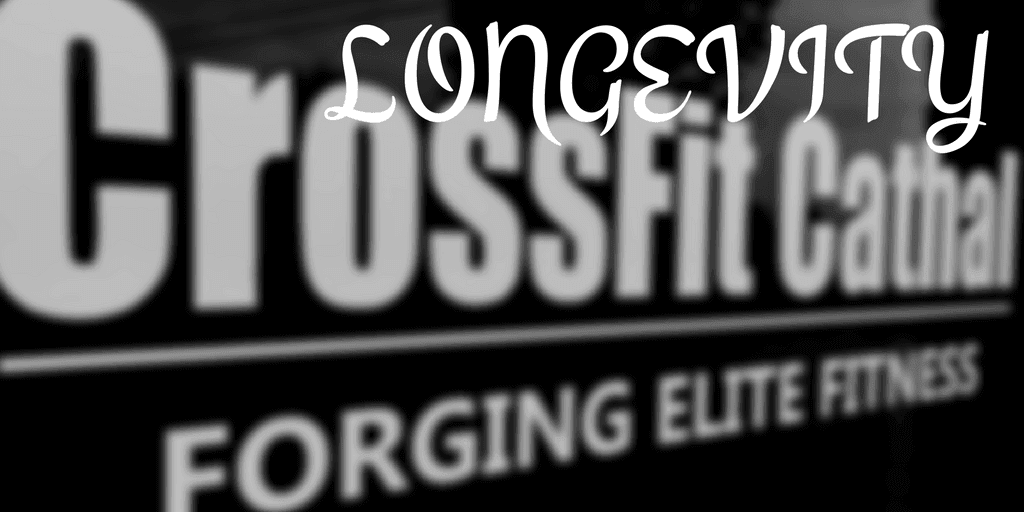
I can’t count the number of times I find myself having conversations about CrossFit and its ability to lengthen a person's quality of life. Many times the conversation will start because someone has their strong opinion on how we train. The opinion is, most of the time, negative and is just a defense mechanism or excuse b/c they are intimidated or scared of the program and its ability to check egos. Just for the mere fact that they can’t do everything as well as they would like to on day one. I can totally understand why this happens. Nobody wants to come from a world where they dominated the leg press every Monday and quarter squat reps for praise, then step in our facility and have their asses handed to them by a 19 year old girl who just signed up for her first semester of college….trust me I have witnessed it first-hand. I enjoy talking about why I believe in this style of training so much. As much effort that goes towards this I can honestly say that an equal amount of effort is applied to our own community of athletes. Here are a couple of things that I think can really help new and old CrossFit athletes stay in the game long-term. 1. Know what you are training for. 99% of CrossFit is to train for overall health and fitness. If that is what you are here to train for then you need to understand what this actually means. I don’t want to break hearts or crush dreams here but, this means you are never going to be battling Matt Fraser or Katrin Davidsdottir for a podium spot at the CrossFit Games. This means that whether you have a 500 pound back squat or a 100 pound back squat is irrelevant. Trust me, I will be the first one to cheer for you as you are trying to PR one of your lifts, however, you need to pick and choose your moments. Seeing members become stronger over the months and years they are here still puts a lump in my throat when they accomplish something that was impossible to do 3 months prior. Always keep in perspective the “risk vs. reward” of your training. Is going for that PR worth it? Is what you’re getting ready to do going to make you function better during your life outside the Box? I am all about the competition side of CrossFit. It is great to have like-minded people around you that push you to be and do better. However, you need to know when to push and when to hold back because something just doesn't feel right. The atmosphere in a CrossFit Box is unmatched (although it is imitated) It is what makes us so unique when comparing what we do to a Golds Gym or other big globo gyms, however, if you can't control yourself inside of that atmosphere, it can be a humbling experience and leave you on the sidelines nursing an injury. Sometimes a slower time or a lighter lift may be a tough pill to swallow but in the long run, much better than the alternative of getting injured because you decide to be a jackass and push the pace with improper form. 2. Train Smart This is probably one of my pet peeves. Too many people think they are a diamond in the rough and want the secret squirrel program. How can I go from a 200 pound back squat to a 600 pound back squat, a 10 minute Fran time to a sub 3 minute time and accomplish this in 2 months? You can’t. If I have seen it once I have seen it a hundred times. It looks great on paper but when it comes time for the rubber to meet the road I usually see it last no more than 3 months. The longer I have been doing this the more I see is that everyone wants to do personalized programming. I don't have any issues with this other than the majority of people who do this, don't need it. People who have no desire to ever compete in CrossFit are spending hours a day following a training program. Again, I don't have any issues with that, if they have the desire, good to go. However, the problem arises when they do all this training and their lifestyle outside the gym is crap. If you are following a rigorous training plan inside of the gym and your life outside of the gym (sleep, nutrition, supplementation, recovery, etc) all need to be well above par. I will see people put hours in at the gym and then piss in their gas tank for dinner and not get adequate recovery. This is a recipe for disaster. People see professional CrossFit athletes on TV and they don't realize the amount of work they put in other than the gym. In my opinion, it is more important what you do outside the gym than in. If your goal is like most, to be fit and healthy, you can easily do that with 3-4 workouts a week. You don't need specialized programming from some big name athlete. You can simply follow a constantly varied, intense, functional workout program like CrossFit and you will be just fine….as long as you train smart. We’re not a fad, we are a lifestyle adjustment. It is putting your health and fitness near the top of your priorities. It is imperative you set yourself up for success in doing this. Good luck and continue to train smart!
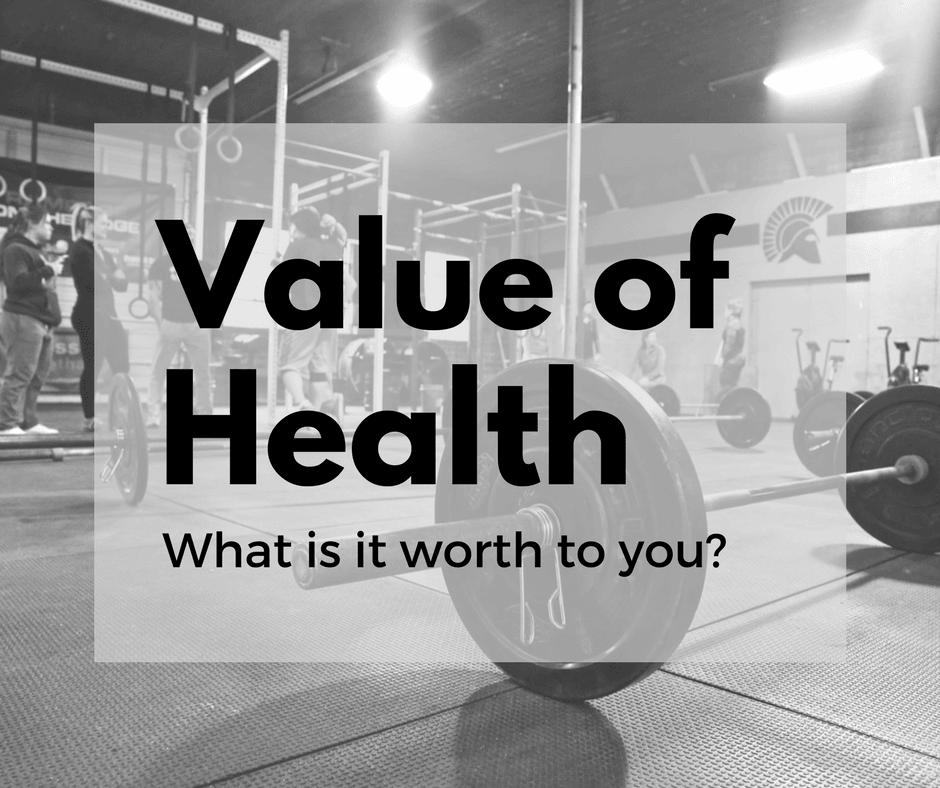
When you join CrossFit Cathal, you may be thinking that you’re just joining a gym. You’ll be wrong. Why is CrossFit so expensive? We invest in our members. We invest in our coaches. We invest in our facility. We invest in giving our members an experience. You’re not paying for access to some equipment, half of which you don’t know how to use. You’re paying for a change in lifestyle. You’re paying for a place that, in many cases, can become the social hub of your days. While classes may last 60 minutes, members hang around for twice that time after they finish their workout. It’s a place where others will hold you accountable for your actions. Being part of a community of like-minded people is going to increase your chances of success. The “suffering” is always easier when you have people to join you! Some call it obsession…if it is creating a healthier lifestyle for you, we will take that label any day. Our program is not for everybody and that is ok. Can anybody do it? If they put their mind to it, grasp the concept and are eager to learn…absolutely. Our style of training requires you to prepare for the long journey by learning the basics. If you don’t take the time to learn the basics, you will fall for every lie and piece of bullshit charlatans advertise. I have always broken things down to simplify the explanation. If your goal was to obtain a 400lb. back squat and you have never back squatted a day in your life, are you going to walk in the gym on day 1 and load 400lbs. on the bar….probably not. America's deadliest sniper started with BRM (Basic Rifle Marksmanship). Nine out of 10 times, the most successful plans are the simplest ones. Squat, press, pull, develop good motor control/movement patterns and condition. If you fail to start with the basics all that will end up happening is frustration and injury. The key is a progressive approach coupled with a solid nutrition program. Stop peddling with bullshit supplements that promise you a beach body in 30 days and make food quality a lifestyle. Stop depending on 6 week exercise DVDs and start training. People who exercise just want to get sweaty; training implies you have a long term plan and a goal. If you are impatient, un-coachable or just have an ego too big to fit through the door then we are not for you. Or better put, you are not for us. The training done at CFC is precise. It is built on education, progression and creating a foundation. We aren’t claiming to know everything but we have more miles walking a barbell out of a squat rack than most have walking into a gym. We all know the saying, “Rome wasn’t built in a day.” The same holds true for our program. There is a lot of bullshit out there in the fitness industry and we battle it on a daily basis. Just because a “personal trainer” has a washboard stomach or can “make you sore” doesn’t mean they know what the fuck they are doing….the case is, they are usually clueless. Most have not picked up a book about their profession since they sat down their online study pamphlet used to obtain their CPT license. What is the price tag for knowledge and expertise, for talented coaches that oversee every workout, focus on your safety and form first, and help to scale movements and weights for your ability, with a constant eye on your movement? Do you value community, a group of friends who share your same enthusiasm for fitness? (And maybe, beer, cheat meals,dogs, family, etc.) This community will be there to cheer you on, no matter what time, score, or weight you put on the barbell each day. They will fist bump you for showing up to train, celebrate your progress, and support you on the rough days in and out of the Box. What is the value of inspiration that is derived from working alongside others who are on the same road to a healthier life? The beauty of setting the example for the younger generation, being their inspiration, and committing to the long-term pursuit of a healthy, fit lifestyle. What price tag would you give that gift? Most people can't put a price tag on preventive maintenance. The real cost comes when it is too late. The cost of chronic disease is such that U.S. medical expenditure is now about $4 trillion a year. In 2008, Price Waterhouse Cooper estimated that roughly half of all U.S. medical expenditure was wasted on unnecessary procedures, administrative inefficiencies, treatment of preventable conditions and so on. The amount spent on chronic disease is a waste. Medicine has no effective treatment for chronic disease: It is symptomatic only. If you have high cholesterol the doctor gives you a drug to bring your cholesterol down, low bone density, a different drug to raise your bone density. If you have paved-over coronary arteries, they can do bypass surgery. If you become glucose intolerant, the doctor can put you on insulin. But all of these are not fixes. They are masking the problem and all of these CAN be prevented. We hold a unique solution to one of the greatest problems (chronic disease) facing our population today. The CrossFit stimulus, which is constantly varied high-intensity functional movement coupled with meat and vegetables, nuts and seeds, some fruit, little starch and no sugar, can give you a pass on chronic disease. It is so simple.
oo many of us mistake intensity as the loudest guy in the gym loudly grunting and groaning his way through a workout. If that were any further from the truth then it would be sitting on the moon. Intensity is defined as power, which is force multiplied by distance, then divided by time. Simply put: Intensity is doing more work faster. You move this pile of rocks from point A to point B. Load up a pack and hump it from point A to point B. The person who can do this faster has a larger work capacity and can be measured as more fit.

